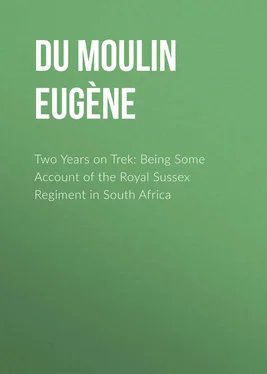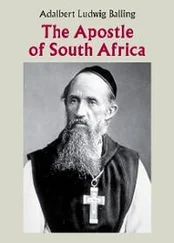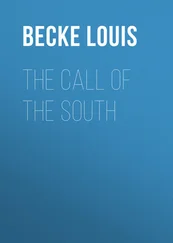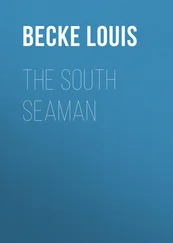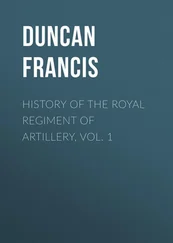Louis Du Moulin - Two Years on Trek - Being Some Account of the Royal Sussex Regiment in South Africa
Здесь есть возможность читать онлайн «Louis Du Moulin - Two Years on Trek - Being Some Account of the Royal Sussex Regiment in South Africa» — ознакомительный отрывок электронной книги совершенно бесплатно, а после прочтения отрывка купить полную версию. В некоторых случаях можно слушать аудио, скачать через торрент в формате fb2 и присутствует краткое содержание. Жанр: foreign_antique, foreign_prose, на английском языке. Описание произведения, (предисловие) а так же отзывы посетителей доступны на портале библиотеки ЛибКат.
- Название:Two Years on Trek: Being Some Account of the Royal Sussex Regiment in South Africa
- Автор:
- Жанр:
- Год:неизвестен
- ISBN:нет данных
- Рейтинг книги:3 / 5. Голосов: 1
-
Избранное:Добавить в избранное
- Отзывы:
-
Ваша оценка:
- 60
- 1
- 2
- 3
- 4
- 5
Two Years on Trek: Being Some Account of the Royal Sussex Regiment in South Africa: краткое содержание, описание и аннотация
Предлагаем к чтению аннотацию, описание, краткое содержание или предисловие (зависит от того, что написал сам автор книги «Two Years on Trek: Being Some Account of the Royal Sussex Regiment in South Africa»). Если вы не нашли необходимую информацию о книге — напишите в комментариях, мы постараемся отыскать её.
Two Years on Trek: Being Some Account of the Royal Sussex Regiment in South Africa — читать онлайн ознакомительный отрывок
Ниже представлен текст книги, разбитый по страницам. Система сохранения места последней прочитанной страницы, позволяет с удобством читать онлайн бесплатно книгу «Two Years on Trek: Being Some Account of the Royal Sussex Regiment in South Africa», без необходимости каждый раз заново искать на чём Вы остановились. Поставьте закладку, и сможете в любой момент перейти на страницу, на которой закончили чтение.
Интервал:
Закладка:
"Hamilton speaks in high terms of praise of the manner in which Bruce Hamilton and Spens of the Shropshire Light Infantry handled the men under Smith-Dorrien's direction."
Johannesburg is a fine town, a long way superior to Pretoria or Bloemfontein: it owes its sudden rise and wonderful growth to its situation on the Witwatersrand and to the enormous development of the mining industries within the last few years.
No doubt when all the shops are open and the streets filled with the usual well-dressed crowd, it must make a fine appearance. When we first entered the town it looked quite desolate, with the magnificent plate glass windows boarded up and the doors covered with corrugated iron, evidently in anticipation of severe rioting and looting. Johannesburg has a most magnificent town railway station at the Park, with waiting rooms and offices, all of ornamental brick, mahogany and plate glass, fitted up in the most gorgeous style with silk curtains, marble floors and decorated ceilings. This is where the millionaires condescend to embark on the train, when they think of honouring one or other of the South African cities with their presence. The contrast between the elaborate Park station and the hovels that serve for stations at Elandsfontein and Bramfontein, is too absurd for words.
On Sunday, the 2nd of June, we were off again at seven o'clock; and the next day found us still heading off towards the north-west of Pretoria, apparently with the intention of circling round, and descending on the capital from the north or north-west. However, while we were on the march, our direction was changed, and we came back on our tracks, having received orders to march straight on Pretoria. When this order was passed by the mounted officers, there was a certain amount of excitement, naturally, as Pretoria was our goal and destination. The band struck up a march and there was a scene of much enthusiasm, one regiment in particular cheering madly, and some individuals producing Union Jacks, which they flourished with all their might.
So on we went, and about three o'clock reached the shelter of the hills outside Pretoria. The 19th Brigade went up the hills a little way, and the rest of us lay down and waited to see if we were wanted. Some of the men fell out and wandered away to the reverse flank, but quickly came running back, as bullets were dropping over the hills, apparently fired at long range and considerable elevation. Indeed, a couple of the City Imperial Volunteers were hit by these spent bullets. Later, the Brigade camped close by, and in the dark, to our astonishment, we found, alongside of us, some of the Sussex Yeomanry; and then we heard of the unfortunate accident to the Duke of Norfolk, which precluded his taking any further part in active operations, and which, unfortunately, prevented our seeing him either.
The 5th of June was the great day of the campaign, culminating in the withdrawal of the enemy and the entry of the victorious troops into his capital.
Very early in the morning, De Lisle's Mounted Infantry had pushed on into the town from the position gained by them the previous evening, and, meeting with no opposition, had demanded its surrender, but were received by Commandant Botha with a request for an armistice and a conference. This was of course agreed to by Lord Roberts, and nine o'clock was the hour fixed for the meeting. Towards that hour, therefore, all the troops who had marched with the 19th and 21st Brigades under General Ian Hamilton, were entering the pass which wound through the hills into the valley of Pretoria. This pass was quite two miles in length, and the surrounding country was composed of a succession of low, broken hills, which, if they had been held by a determined enemy, would have given us considerable trouble to capture. It has always been a marvel why the Boers did not defend Pretoria, surrounded, as it is, by a network of hills, topped by several strong forts built, I suppose, for that purpose; but probably the fact was that they would have been unable to get their big guns dragged up and mounted in sufficient time to oppose our advance, and therefore thought it wise not to risk them. Undoubtedly, Lord Roberts' rapid advance, or rather his dash from Bloemfontein to Pretoria, will be recorded in history as one of the remarkable military achievements of the century; and the breathless rapidity with which his movements were planned and executed had possibly paralysed the Boer commanders, and influenced their decision to sacrifice Pretoria, and to fall back to the east on the railway, as this would leave open a convenient line of retreat and an easy means of departure, whenever necessary, for Mr. Kruger and the foreign mercenaries, through Komati Poort and Delagoa Bay.
About nine o'clock, the hills opened out, and a mass of buildings could be seen in the dim distance: this was Pretoria, and, forming up on a low hill, a mile or two closer in, we were enabled to have a long look at the town about which we had heard so much of late years.
Between us and the town, and among a multitude of iron-roofed houses, was the famous race-course where so many of our unfortunate prisoners had been confined: we could just distinguish with our glasses the big enclosure with its high fence of corrugated iron, but it was too dim and misty at that hour of the morning for us to make out much more.
Nine o'clock came but no Commandant Botha, and no signs of him, or of anyone else. We were all ready for a durbar or a conference, formed up in three sides of a hollow square, and everyone who could raise a kodak had produced it and pushed himself up into a prominent position, ready to take snapshots of the celebrities. And so we waited for an hour, speculating idly as to the cause of the commandant's non-appearance, and inclining to the belief that he was merely bluffing, to gain time to get his guns away; whether he was or not we have never heard, but it was a very suspicious circumstance that he played a similar game on another occasion, and caused us to wait two days, which would have been valuable time to us had we been able to advance.
Eventually the troops moved on, and camped to the west of the town and just outside the notorious race-course, where merely a few sick prisoners were now left, the majority having been moved some time previously to Waterval; while the officers had been confined in the Model School and other places in the town. On our approach, these officers, over a hundred in number, had succeeded in bouncing the few of their guards who still remained, and had effected their escape. They came and reported themselves to Lord Roberts, who afterwards inspected them on parade and congratulated them on obtaining their freedom.
The Brigade paraded in the early afternoon and formed up to march through the streets of the capital; the Derbyshire were leading, as it was their turn, and, headed by their band, they moved off in column of route; we followed, what was left of our band showing the way, and after us came the Camerons and then the C.I.V.
The streets were crammed with troops, as the Mounted Infantry and their baggage were passing along with us, and moving to their camp on the other side of the town; but when we approached the centre of the city they branched off to the left. The Guards' Brigade had preceded us and had left a number of men to keep the ground clear, as we entered on to the square. There, facing the Union Jack, floating (never again to be removed) proudly on the Town Hall, sat Lord Roberts on his charger, surrounded by the officers of his staff; while on the other side of the square, stood a dense, sullen mass of people – a few British subjects, but mostly foreigners who had business interests in Pretoria, with many women and children. What impressed us most was their silence: many of the women were in tears, and most of the men glared at us with anything but friendly glances. And so we passed on, saluting Lord Roberts, and meeting General Kelly's friendly glance, and marched away down the principal street, named Kerk or Church Street.
Читать дальшеИнтервал:
Закладка:
Похожие книги на «Two Years on Trek: Being Some Account of the Royal Sussex Regiment in South Africa»
Представляем Вашему вниманию похожие книги на «Two Years on Trek: Being Some Account of the Royal Sussex Regiment in South Africa» списком для выбора. Мы отобрали схожую по названию и смыслу литературу в надежде предоставить читателям больше вариантов отыскать новые, интересные, ещё непрочитанные произведения.
Обсуждение, отзывы о книге «Two Years on Trek: Being Some Account of the Royal Sussex Regiment in South Africa» и просто собственные мнения читателей. Оставьте ваши комментарии, напишите, что Вы думаете о произведении, его смысле или главных героях. Укажите что конкретно понравилось, а что нет, и почему Вы так считаете.
